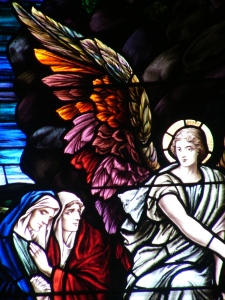On the evening of that day, the first day of the week, the doors being locked where the disciples were for fear of the Jews, Jesus came and stood among them and said to them, “Peace be with you.” When he had said this, he showed them his hands and his side. Then the disciples were glad when they saw the Lord. Jesus said to them again, “Peace be with you. As the Father has sent me, even so I am sending you.” (John 20:19-21 ESV)
Imagine that fateful Sunday evening.
The sun is setting outside the window. Its shutters drawn, flickers of light intrude through cracks in the screen meant to keep out prying eyes.
The doors, locked and bolted against unwanted “guests”, proves no barrier to the fear that continues to grow in the hearts of all present, threatening to overwhelm them.
 The silence: deafening. Broken only by an excruciating groan from the protesting joints of a wooden chair as one of those seated shifts their weight.
The silence: deafening. Broken only by an excruciating groan from the protesting joints of a wooden chair as one of those seated shifts their weight.
No one speaks. But volumes are communicated as ashamed, bloodshot and guilt-ridden eyes meet across the room and quickly withdraw.
Suddenly, a familiar voice, clear and strong, declares, “Peace be with you.”
As if the roof were ripped off the house and the noon day sun flooded the room so their hearts were engulfed in joy.
In one glorious moment their inconsolable sorrow was unexpectantly turned to inexpressible exultation.
Deus Ex Machina
From the disciples point of view the Resurrection must have seemed like deus ex machina (pronounced ‘day-s ex mac-in-ah) because they obviously didn’t see it coming.
Deus ex machina is a Latin literary term that literally translates to ‘god out of a machine’ and refers to an event in a story which suddenly and unexplainably resolves an unsolvable problem that a character or characters have gotten themselves into. It is as though, in the closing chapters of a book or the final moments in a film, the hero is about to be unquestionably devoured by an evil monster when suddenly, out of nowhere, they are rescued by a never before seen character riding in on a white horse to slay the aforementioned evil monster. And they all live happily ever after.
Most literary critics regard deus ex machina pejoratively because it shatters the reality of the world created by the author as it removes any sense of real peril (the hero is going to be rescued anyway so why worry?).
Was the resurrection a god out of a machine? Was it an unexplainable resolution that no one saw coming? Or is there another explanation?
Eucatastrophe
J.R.R. Tolkien believed there is. In his essay ‘On Fairy Stories’ he coined the term ‘Eucatastrophe‘ which he describes as,
“the good catastrophe, the sudden joyous “turn” (for there is no true end to any fairy-tale): … it is a sudden and miraculous grace: never to be counted on to recur. It does not deny the existence of dyscatastrophe, of sorrow and failure: the possibility of these is necessary to the joy of deliverance; it denies (in the face of much evidence, if you will) universal final defeat and in so far is evangelium [good news], giving a fleeting glimpse of Joy, Joy beyond the walls of the world, poignant as grief…”
It is differentiated from deus ex machina by its “inner consistency of reality”, meaning that it arises naturally from the story having been foreshadowed by the author.
Tolkien continues, describing the Gospel from this perspective,
“The Gospels contain a fairy story, or a story of a larger kind which embraces all the essence of fairy-stories. They contain many marvels—peculiarly artistic, beautiful, and moving: “mythical” in their perfect, self-contained significance; and among the marvels is the greatest and most complete conceivable Eucatastrophe. But this story has entered History and the primary world [that is, our world]; the desire and aspiration of sub-creation has been raised to the fulfilment of Creation. The Birth of Christ is the Eucatastrophe of Man’s history. The Resurrection is the Eucatastrophe of the story of the Incarnation. This story begins and ends in joy. It has pre-eminently the “inner consistency of reality.” There is no tale ever told that men would rather find was true, and none which so many sceptical men have accepted as true on its own merits. For the Art of it has the supremely convincing tone of Primary Art, that is, of Creation. To reject it leads either to sadness or to wrath.”
Tolkien could speak of the resurrection as the Eucatastrophe, the sudden joyous turn, of the story of the incarnation because it had been foreshadowed so well by the Author. It was no deus ex machina plotting device hastily thrown in so we might have a cheerful, happy ending.
Time and again Jesus predicted his own death and subsequent resurrection (Matthew 16:21, 17:22-23, 20:17-19; Mark 8:31, 9:31, 10:32-34; Luke 9:22, 44-45, 18:31-34; John 2:19-22). The disciples should not have been surprised by Jesus’ death and resurrection. They had Jesus’ word that his death would not be the final word in the story, not to mention the testimony of Scripture.
Hundreds of years before the Incarnation the prophet Isaiah foreshadowed the resurrection in these words, speaking of the Suffering Servant of the Lord, the Messiah,
“And they made his grave with the wicked
and with a rich man in his death,
although he had done no violence,
and there was no deceit in his mouth.
Yet it was the will of the Lord to crush him;
he has put him to grief;
when his soul makes an offering for guilt,
he shall see his offspring; he shall prolong his days;
the will of the Lord shall prosper in his hand.” (Isaiah 53:9-10 ESV)
Like the disciples Jesus’ resurrection speaks, “Peace,” to us in this the present, ‘primary world’ because we have now been declared right with God on his account (Romans 4:25, 5:1) and can now live in anticipation of his promise of peace in the future world where ‘Legend and History have met and fused’ and we see with gladness the Lord who makes all things new (Revelation 21:1-8).

3 thoughts on “The Resurrection: Deus Ex Machina or Eucatastrophe?”